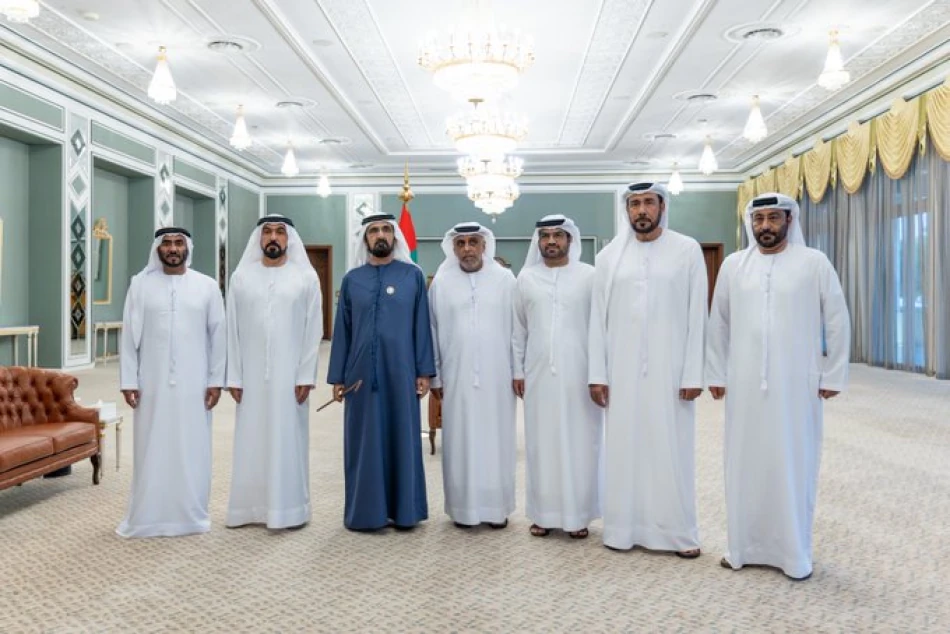
Dubai's Retired Police Commanders Meet with Sheikh Mohammed bin Rashid
Dubai's Leadership Honors Security Veterans in Strategic Move to Strengthen Institutional Legacy
Sheikh Mohammed bin Rashid Al Maktoum, UAE Vice President, Prime Minister, and Ruler of Dubai, met with retired Dubai Police brigadiers who played pivotal roles in establishing the emirate's world-class security framework. The high-profile gathering underscores Dubai's systematic approach to institutional memory preservation and its commitment to recognizing the architects of its transformation into a global security benchmark.
Recognition Beyond Ceremony: A Strategic Leadership Philosophy
The meeting, held at the Majlis Al-Mudhaif in Dar Al Ittihad, brought together six retired brigadiers: Khalil Al Mansoori, Abdul Qudoos Al Obaydli, Abdullah Al Ghaithi, Ali Ateeq, Ali Ghanem, and Jamal Al Jallaf. These veterans represent the foundational generation that transformed Dubai's security apparatus from a regional force into an internationally recognized model.
Sheikh Mohammed's remarks revealed the deeper strategic thinking behind such recognition: "Retired security personnel are a solid pillar in Dubai's security journey. They carried out their trust with honor and sincerity, raising the banner of dedication in the most difficult and precise situations."
Institutional Memory as Competitive Advantage
This approach reflects Dubai's broader governance philosophy of treating institutional knowledge as a strategic asset. Unlike many jurisdictions where retiring officials fade into obscurity, Dubai actively cultivates relationships with former leaders, creating continuity bridges that preserve operational wisdom and cultural values.
The Dubai Security Model: From Regional to Global Standard
Dubai's security transformation parallels its economic evolution. The emirate's police force has become synonymous with innovation, from deploying AI-powered patrol systems to establishing specialized units for cybercrime and financial investigations. This reputation didn't emerge overnight—it was built by the generation of leaders now being honored.
Comparative Context: Security as Economic Infrastructure
Dubai's security excellence directly correlates with its position as a global business hub. Similar to Singapore's approach to public safety as economic infrastructure, Dubai recognized early that world-class security would be essential for attracting international investment and tourism. The emirate's crime rates consistently rank among the world's lowest, a factor that multinational corporations explicitly cite when establishing regional headquarters.
This contrasts sharply with other rapidly developing cities that prioritized economic growth over security infrastructure, often facing costly corrections later. Dubai's early investment in professional security leadership—represented by the honored brigadiers—proved prescient as the emirate scaled globally.
Leadership Succession and Knowledge Transfer
The meeting signals Dubai's sophisticated approach to leadership transition. By maintaining formal relationships with retired senior officials, the emirate creates informal advisory networks that current leadership can leverage during challenging periods. This practice, common in countries like Japan and Germany, helps prevent the loss of institutional knowledge that often accompanies leadership changes.
Cultural Reinforcement Strategy
Sheikh Mohammed's emphasis on loyalty, discipline, and competence serves dual purposes: honoring past contributions while reinforcing cultural expectations for current personnel. The public nature of this recognition sends clear signals about valued behaviors and long-term career prospects within Dubai's security apparatus.
The retired brigadiers' response—emphasizing that serving the nation remains their highest honor—demonstrates the successful cultivation of institutional culture that transcends individual careers.
Implications for Dubai's Future Security Architecture
This recognition ceremony occurs as Dubai prepares for Expo 2030 and positions itself for the next phase of global integration. The emirate's security challenges are evolving from traditional law enforcement toward sophisticated threats including cybersecurity, financial crimes, and managing massive international events.
By honoring the architects of Dubai's current security excellence, leadership reinforces the importance of long-term thinking and institutional continuity—qualities essential for navigating future challenges. The meeting represents more than ceremonial recognition; it's a strategic investment in maintaining the cultural foundations that enabled Dubai's security transformation.
Most Viewed News

 Sara Khaled
Sara Khaled






